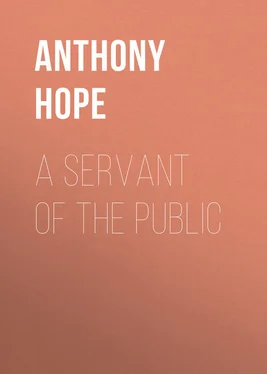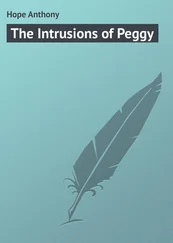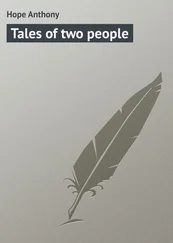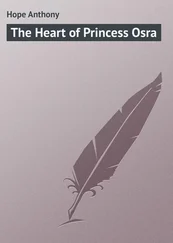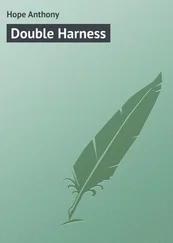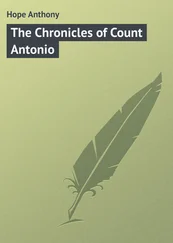Anthony Hope - A Servant of the Public
Здесь есть возможность читать онлайн «Anthony Hope - A Servant of the Public» — ознакомительный отрывок электронной книги совершенно бесплатно, а после прочтения отрывка купить полную версию. В некоторых случаях можно слушать аудио, скачать через торрент в формате fb2 и присутствует краткое содержание. Жанр: foreign_prose, на английском языке. Описание произведения, (предисловие) а так же отзывы посетителей доступны на портале библиотеки ЛибКат.
- Название:A Servant of the Public
- Автор:
- Жанр:
- Год:неизвестен
- ISBN:нет данных
- Рейтинг книги:3 / 5. Голосов: 1
-
Избранное:Добавить в избранное
- Отзывы:
-
Ваша оценка:
- 60
- 1
- 2
- 3
- 4
- 5
A Servant of the Public: краткое содержание, описание и аннотация
Предлагаем к чтению аннотацию, описание, краткое содержание или предисловие (зависит от того, что написал сам автор книги «A Servant of the Public»). Если вы не нашли необходимую информацию о книге — напишите в комментариях, мы постараемся отыскать её.
A Servant of the Public — читать онлайн ознакомительный отрывок
Ниже представлен текст книги, разбитый по страницам. Система сохранения места последней прочитанной страницы, позволяет с удобством читать онлайн бесплатно книгу «A Servant of the Public», без необходимости каждый раз заново искать на чём Вы остановились. Поставьте закладку, и сможете в любой момент перейти на страницу, на которой закончили чтение.
Интервал:
Закладка:
"And how the devil am I to talk to Alice about it?" he exclaimed petulantly, as he struck across the front of Buckingham Palace and headed up Constitution Hill. There had been a general impression that he would marry Alice Muddock, and a general impression about us assumes to ourselves a vaguely obligatory force. We may not justify it, but we feel the need for some apology if we refuse. Besides Ashley had, up to a certain point, shared the impression, although in a faint far-off way, regarding the suggested alliance not as the aim of his life but as a possible and not unacceptable bourn of his youth. His entrance into the firm was a topic so closely connected that he felt much awkwardness in discussing it with Alice Muddock. Of her feelings he thought less than of his own; he was not by nature a selfish man, but he had now fallen into the selfishness of a great pre-occupation. The smallest joy or the lightest sorrow for Ora Pinsent would have filled his mind. It is difficult to feel in anything like this way towards more than one person at a time. His sympathy for Alice Muddock was blunted and he excused its want of acuteness by an affected modesty which questioned her concern in him.
It chanced that Lady Kilnorton was at lunch. She seemed in high spirits and talked vigorously. Her theme was the artistic temperament; she blamed its slavishness to the moment. Lady Muddock showed an anxiety to be furnished with details for purposes of increased disapproval; Alice was judicial. One man among three women, Ashley would have been content to listen, but, when appealed to, he defended the aspersed disposition. He felt the conversation approaching Ora Pinsent, step by step; she was in all their minds; the only case in point known to Lady Muddock, the instance most interesting to Alice, an unwelcome persistent presence to Irene, to him a subject to be neither encouraged nor avoided without risk of self-betrayal. It was curious how she had come into the circle of their lives, and having entered seemed to dominate it. But presently he grew sure of his face and, for the rest, preferred that they should abuse her rather than not speak of her; he grudged every abstraction of his thoughts which banished her image.
The discussion brought its trials. Irene's well-restrained jealousy and Lady Muddock's inquisitive disapproval were merely amusing; it was Alice's judicial attitude which stirred him to resentment. To assess and assay with this cold-blooded scientific accuracy seemed inhuman, almost from its excess of science unscientific, since it was a method so unsuited to the subject.
"Now take Ora," said Irene, at last grasping the nettle. "There's nothing she wouldn't do for you at one moment, the next she wouldn't do anything at all for you."
"For her acquaintances, you mean?" Alice asked.
"Oh, no, my dear. For anybody, for her best friend. You can't call her either good or bad. She's just fluke, pure fluke."
"Well, I know it's the thing to pretend not to like flukes – " Ashley began. The thin jocularity served for a shield.
"Oh, what's the use of asking a man? He just sees her face, that's all. Nobody's denying her looks." Lady Kilnorton seemed petulant.
"Of course a life like hers," observed Lady Muddock, "is very demoralising."
"My dear Lady Muddock, why?" asked Ashley, growing exasperated.
"Well, I only know what Minna Soames says, and – "
"Mother dear, Minna Soames is a goose," Alice remarked. Ashley was grateful, but still with reservations as to the judicial tone.
Irene Kilnorton, engaged in her secret task of justifying herself and taking a rosy view of Bowdon's feelings, talked more for her own ends than for those of the company.
"That sort of people suit one another very well," she went on. "They know what to expect of each other. Harm comes only when people of a different sort get entangled with them."
"You're vague," said Ashley. "What different sort?" He had partly fathomed her mood now, and his eyes were mischievous as he looked at her.
"Sensible people, Mr. Mead." There was a touch of asperity in the brief retort, which made a thrust from him seem excusable.
"Suppose Lord Bowdon had never seen you," he said with plausible gravity, "and, being in that state of darkness, had fallen in love with Miss Pinsent; would it have been so very surprising?"
"Very," said Irene Kilnorton.
"And dreadful?"
"Well, bad for him. He'd never have got on with her and – "
"There's Mr. Fenning," interposed Alice with a quiet laugh. A moment's pause ensued. Ashley had been startled at the introduction of the name, but he recovered himself directly.
"Oh, well," he said, "of course there's Mr. Fenning. I'd forgotten him. But he's quite accidental. Leave him out. He's not part of the case."
"But there's so often a Mr. Fenning," Alice persisted. "Can he be considered quite accidental?"
Ashley had made much the same remark in different words to Irene Kilnorton a few weeks before; but remarks do not bear transplanting.
"Isn't that rather a traditional view?" he asked.
"You mean a prejudiced one?"
"Well, yes."
"I suppose so. But prejudices start somehow, don't they?" Her smile was very gentle, but still, to his mind, horribly aloof and judicial. Could she not understand how a woman might be carried away, and blunder into a Mr. Fenning, per incuriam and all in a minute (so to speak)? In such a case was it to be expected that the Mr. Fenning in question should be all in all to her? In some ways perhaps she must acknowledge his existence; but at any rate she needn't Darby-and-Joan it with him!
"Poor dear Ora!" said Irene Kilnorton after a pause. Yet she was not naturally malicious any more than Ashley Mead was naturally selfish. If we are responsible for the moods we raise in others Miss Pinsent's account was mounting up. Ashley allowed himself the retort of a laugh as Lady Muddock rose from the table.
"I came to talk to you," he said to Alice, as she passed him.
"Then drink your coffee quick, and come into the garden," she answered with her usual frank kindness. When she looked at him her aspect and air became less judicial.
In the garden he opened the subject of Sir James' proposal; his eyes were set straight in front of him, hers on the ground. Her answer would have dismayed Sir James, and it surprised Ashley. She was energetically, almost passionately, opposed to his entering the business.
"It's not your line, or your taste, or your proper work," she said. "What's the good of being rich if you're doing what you hate all the time?"
"I felt just like that," he said gratefully, "but I was afraid that I felt like it because I was a fool."
"You can make your own way. Don't sell yourself to the business."
He glanced at her stealthily; her colour had risen and her lip trembled. Did she think of anything besides the business when she bade him not sell himself? A moment later she laughed uneasily, as, with a reference to the conversation at lunch, she said,
"You've too much of the artistic temperament for Buckingham Palace Road."
"I? I the artistic temperament?" He accepted the trite phrase as a useful enough symbol of what they both meant.
"Yes," she answered steadily. "A good deal of it."
"Then I come under Irene Kilnorton's censures?"
"Under a good many of them, yes."
Something in her manner again annoyed and piqued him. She was judging again, and judging him. But she was interesting him also. She spoke of him; she knew him well: and just now he was in some doubt about himself.
"I don't know what you mean," he said, seeking to draw her out.
"Oh, things carry you away; and you like it. You don't want to get to a comfortable place and stay there. I'm not saying anything you mind?"
"No. I don't think so, at least."
Читать дальшеИнтервал:
Закладка:
Похожие книги на «A Servant of the Public»
Представляем Вашему вниманию похожие книги на «A Servant of the Public» списком для выбора. Мы отобрали схожую по названию и смыслу литературу в надежде предоставить читателям больше вариантов отыскать новые, интересные, ещё непрочитанные произведения.
Обсуждение, отзывы о книге «A Servant of the Public» и просто собственные мнения читателей. Оставьте ваши комментарии, напишите, что Вы думаете о произведении, его смысле или главных героях. Укажите что конкретно понравилось, а что нет, и почему Вы так считаете.
